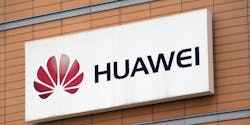Department of Commerce Restricts Huawei’s Ability to Import Semiconductors
On Friday, May 15, the U.S. Department of Commerce announced it would modify existing policy to prevent semiconductors from companies produced using U.S. software and technology from being shipped to Huawei Technologies. According to a statement from the department, the move is intended to cut off “Huawei’s efforts to undermine U.S. export controls.”
“Despite the Entity List actions the Department took last year, Huawei and its foreign affiliates have stepped-up efforts to undermine these national security-based restrictions through an indigenization effort,” said Secretary of Commerce Wilber Ross. “However, that effort is still dependent on U.S. technologies.”
Reuters reports that China is already preparing a counterattack: China’s Global Times said Friday that the Chinese government was preparing to suspend purchase of Boeing airplanes and place several high-profile U.S. telecommunications companies on their own “unreliable entity list.” Those companies include Apple Inc., Cisco Systems Inc., Qualcomm Inc.
The U.S. policy change, which will become operational following a 120-day grace period, will make it harder for companies producing semiconductor designs or chips to sell those products to Huawei if those companies are using U.S.-made equipment or software. The move is likely to hamper the operations of Taiwan Semiconductor Manufacturing Co Ltd., a prominent supplier of custom chips and semiconductors for Huawei.
According to Reuters, TSMC has said they are “following the U.S. export rule change closely” and analyzing the legal situation. Also on May 15, TSMC announced they would build a new semiconductor factory in Arizona. The company said in a statement that construction on the factory is set to begin in 2021.
The conflict between the U.S. government and Huawei Technologies is a long-running struggle. The United States government has taken a hard stance against the Chinese telecommunications and hardware company, claiming the Chinese government uses company operations to spy on other countries. Huawei has denied all wrongdoing and repeatedly insisted that it is an independent entity from the Chinese government and that the United States is treating it unfairly.
In February, the Department of Justice indicted Huawei for conspiracy to violate the Racketeer Influenced and Corrupt Organizations Act for theft of intellectual property and illegal trade to Iran and North Korea. Shortly afterwards, a federal judge tossed a lawsuit filed by Huawei; the suit alleged that the United States, by banning government contractors from using Huawei equipment, had passed an un-Constitutional bill of attainder. In a statement issued at the time, Huawei complained that the U.S. was “using the strength of an entire nation to come after a private company.”
About the Author
IW Staff
Find contact information for the IndustryWeek staff: Contact IndustryWeek
